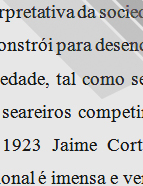

................................
In 1929, a Spanish translation of the History of Portugal was published by Labor Publishing in Barcelona. Its text had already been translated into English in 1928 (Sérgio, Sketches), but the Portuguese original would not be printed until 1972 (Sérgio, Breve). This would mark the endpoint of those early years of ongoing work towards reform s in Portugal. Here, history occupied a central role as an intellectual tool for action upon society. However, for Sérgio, it was history without archival research—mere reflection on matters that were left to investigative history, which he often disparaged as purely archival erudition. On the contrary, what Sérgio proposed, as Jaime Cortesão would say thirty years later, was "a critical assessment of the past, a moral rule for the future." (Sérgio, Combates, vol. II, p. 281). And this, after all, would be the ultimate utility—and necessity—that the seareiros attributed to the History of Portugal: to serve as a showcase for a critical vision of the past and to establish a regulatory norm for the moral behaviours of society in the future.
The journeys and destinations of each of the two central authors are established in 1929/1930, in the Historia de Portugal by António Sérgio and Os Factores Democráticos na Formação de Portugal by Jaime Cortesão—a title that is a whole program me and not coinciden tally explained in the História do Regímen Republicano em Portugal [History of the Republican Regime in Portuga l]. A necessary concept to ground the political proposals defended by the group, this search into the past aimed to build a solid foundation for a desired future. These endpoints were, at the same time, meant to be starting points. Both Sérgio and Cortesão saw history as a means of applying their ideas to the interpretation of the country's social reality and as a way of thinking to ground the reformist action of Portugal in their time. However, while Sérgio sought levers for indispensable national reform, starting with the production and distribution of wealth, Cortesão primarily sought the foundations of popular sovereignty and its manifestations in the past. Two different approaches with the same goal: to promote the emergence of a new mentality. For Sérgio, it was primarily about finding an elite to lead the reforms, while for Cortesão, it was about understanding the mechanisms that led to popular demonstrations and democratic achievements that sustained the Nation’s expression and its expansion throughout the world. Two positions that were not initially divergent, but exile would bring them even closer together. Though Cortesão came from republican militancy and Sérgio from monarchical liberalism, they had converged early on in defence of the democratic regime.
